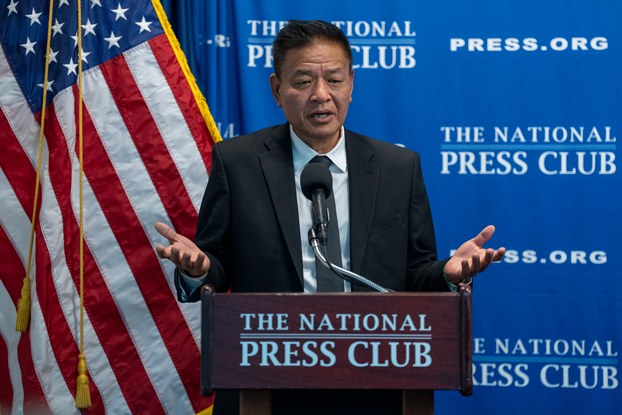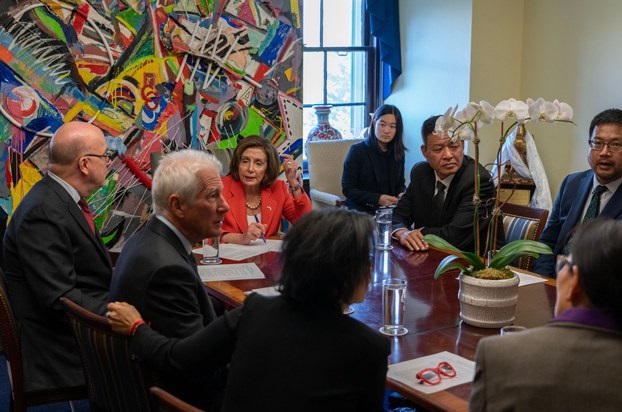Reject name change, says Tibet’s Govt – in-exile

The leader of Tibet’s government-in-exile has urged the international community not to follow China’s decision to replace the use of the term “Tibet” with “Xizang” as the romanized Chinese name on official diplomatic documents.
Chinese media and the official account of the United Front Work Department of the Communist Party of China, “United Front News,” said there was “no more Tibet in the official documents of the Chinese Ministry of Foreign Affairs,” RFA reported on Oct. 12.
The United Front tries to co-opt and neutralize elite individuals and organizations inside and outside mainland China, which are sources of potential opposition to the policies of the ruling Chinese Communist Party, or CCP.
The RFA report noted that an English transcript of a speech delivered by Chinese Foreign Minister Wang Yi at the opening ceremony of the Third Trans-Himalaya Forum for International Cooperation on Oct. 5, used ”Xizang” throughout the copy to refer to Tibet.
“I urge the international community not to compromise with the CCP’s efforts to reshape history and to stick to the established term ‘Tibet,’” Sikyong Penpa Tsering, the democratically elected political leader of the Central Tibetan Administration, told Radio Free Asia in an exclusive interview in Washington on Thursday.
“By imposing its Chinese concept on the English one, the Chinese government wants to tell others that Tibet is just the ‘Tibet Autonomous Region,’” he said.
“The Chinese government cannot justify themselves by propagating propaganda to change the historical fact,” he said. “Many history books and documents that exist in the past refer to ‘Tibet’ as Tibet.”
The name change comes as CCP scholars push for an amendment to the translated name which they claim will prevent the Dalai Lama, the spiritual leader of Tibetan Buddhism, from reestablishing the right to speak about Tibet. The scholars argue that the CCP needs to promote its legitimate occupation and rule of the western autonomous region.
Tsering, who has held the office of sikyong since May 27, 2021, is on the last leg of an official visit from Sept. 29-Oct. 24, that includes Latin America, where he aims to build support for the Tibetan cause, and North America, where he continues to undertake Tibet advocacy campaigns.

In Washington, Tsering met with Nancy Pelosi, former speaker of the U.S. House of Representatives, who also attended the 16th anniversary of the conferment of the U.S. Congressional Gold Medal to His Holiness the 14th Dalai Lama on Oct. 17. U.S. lawmakers, including Reps. Jim McGovern (D-MA), Chris Smith (R-NJ), Betty McCollum (D-MN) and Jan Schakowsky (D-IL), attended the event.
Pelosi called the bestowal of the highest civilian honor to His Holiness as “a source of pride” and stressed the bipartisan support of U.S. legislators towards the Dalai Lama.
Tsering also addressed the National Press Club on Oct. 18 about Tibet’s geopolitical relevance, its spiritual and cultural impact, and the effects of President Xi Jinping’s “One China” policy, which Tibetans view as a measure to erase their identity, culture, religion and language.
Before visiting Washington, Tsering visited Brazil, Costa Rica, Colombia and Mexico in a bid to strengthen the ties between the Tibetan government-in-exile, headquartered in Dharamsala, India, and Latin America.
-RFA report, Oct 20, 2023
-
Book Shelf
-
 Book Review
DESTINY OF A DYSFUNCTIONAL NUCLEAR STATE
Book Review
DESTINY OF A DYSFUNCTIONAL NUCLEAR STATE
- Book ReviewChina FO Presser Where is the fountainhead of jihad?
- Book ReviewNews Pak Syndrome bedevils Indo-Bangla ties
- Book Review Understanding Vedic Equality….: Book Review
- Book Review Buddhism Made Easy: Book Review
- Book ReviewNews Elegant Summary Of Krishnamurti’s teachings
- Book Review Review: Perspectives: The Timeless Way of Wisdom
- Book ReviewNews Rituals too a world of Rhythm
- Book Review Marx After Marxism
- Book Review John Updike’s Terrorist – a review
-
-
Recent Top Post
-
 Commentaries
Impasse over BRI Projects in Nepal
Commentaries
Impasse over BRI Projects in Nepal
-
 CommentariesNews
Yet another Musical Chairs in Kathmandu
CommentariesNews
Yet another Musical Chairs in Kathmandu
-
 CommentariesTop Story
Spurt in Anti-India Activities in Canada
CommentariesTop Story
Spurt in Anti-India Activities in Canada
-
 NewsTop Story
Nepal: Political Stability Under Threat Again
NewsTop Story
Nepal: Political Stability Under Threat Again
-
 NewsTop Story
Accountability Tryst With 2024 Ballot….
NewsTop Story
Accountability Tryst With 2024 Ballot….
-
 NewsTop Story
What Would “Total Victory” Mean in Gaza?
NewsTop Story
What Would “Total Victory” Mean in Gaza?
-
 CommentariesTop Story
The Occupation of Territory in War
CommentariesTop Story
The Occupation of Territory in War
-
 CommentariesTop Story
Pakistan: Infighting in ruling elite intensifies following shock election result
CommentariesTop Story
Pakistan: Infighting in ruling elite intensifies following shock election result
-
 CommentariesTop Story
Proforma Polls in Pakistan Today
CommentariesTop Story
Proforma Polls in Pakistan Today
-
 CommentariesTop Story
Global South Dithering Away from BRI
CommentariesTop Story
Global South Dithering Away from BRI
-
AdSense code



















